Capital Update – For the Week Ending November 17, 2023
In this week’s National Pork Producers Council (NPPC) Friday recap: NPPC shows robust presence at 80th NAFB ‘Trade Talk’; Farm Bill extended a year in new short-term funding measure; USDA to add separate category for hog housing premiums; IL pork producer provides perspective on sustainability; EPA taking nominations for new Agricultural Water Quality Panel, seeking farm air reporting; USTR’s Tai meets with IPEF, APEC ministers; NPPC President Hays to take top post with Missouri Pork; and NPPC past president to lead U.S. Meat Export Federation. Take a deeper dive below.
NOTE: Due to the upcoming U.S. Thanksgiving holiday, Capital Update will not publish next week. We will resume publication the following week.
NAFB ‘Trade Talk’ | Farm Bill extended | USDA adds category for hog housing premiums | IL pork producer perspective on sustainability | EPA Agricultural Water Quality Panel | EPA farm air reporting | USTR meets with IPEF, APEC ministers | NPPC President Hays to take top post with Missouri Pork | NPPC past president to lead U.S. Meat Export Federation
NPPC Shows Robust Presence at NAFB’s ‘Trade Talk’
What happened: A dynamic team from NPPC descended to Kansas City, MO, to participate in the National Association of Farm Broadcasters (NAFB) national convention. For this year’s 80th convention, NPPC’s delegation included President Scott Hays; Michael Formica, chief legal strategist; Maria C. Zieba, vice president of international affairs; Andrew Bailey, senior policy and compliance adviser; and Holly Cook, economist.
Hays and the NPPC delegation addressed a spectrum of topics. These ranged from outlining the organization’s strategic goals to tackling challenges such as California’s Proposition 12, shaping the next Farm Bill, and developing a more robust swine traceability system. They also talked about international trade priorities, foreign animal disease prevention and preparedness, environmental issues, and a comprehensive analysis of the current economic state of the pork industry.
Why it matters: The convention’s renowned ‘Trade Talk,’ provided opportunities for the agriculture industry and NAFB’s influential member broadcasters to connect and network. NPPC leveraged the event to discuss vital U.S. pork industry priorities with more than 100 agricultural broadcasters. NPPC’s strong showing demonstrated its commitment to fostering a resilient and thriving pork industry while addressing pressing challenges and shaping the future landscape.
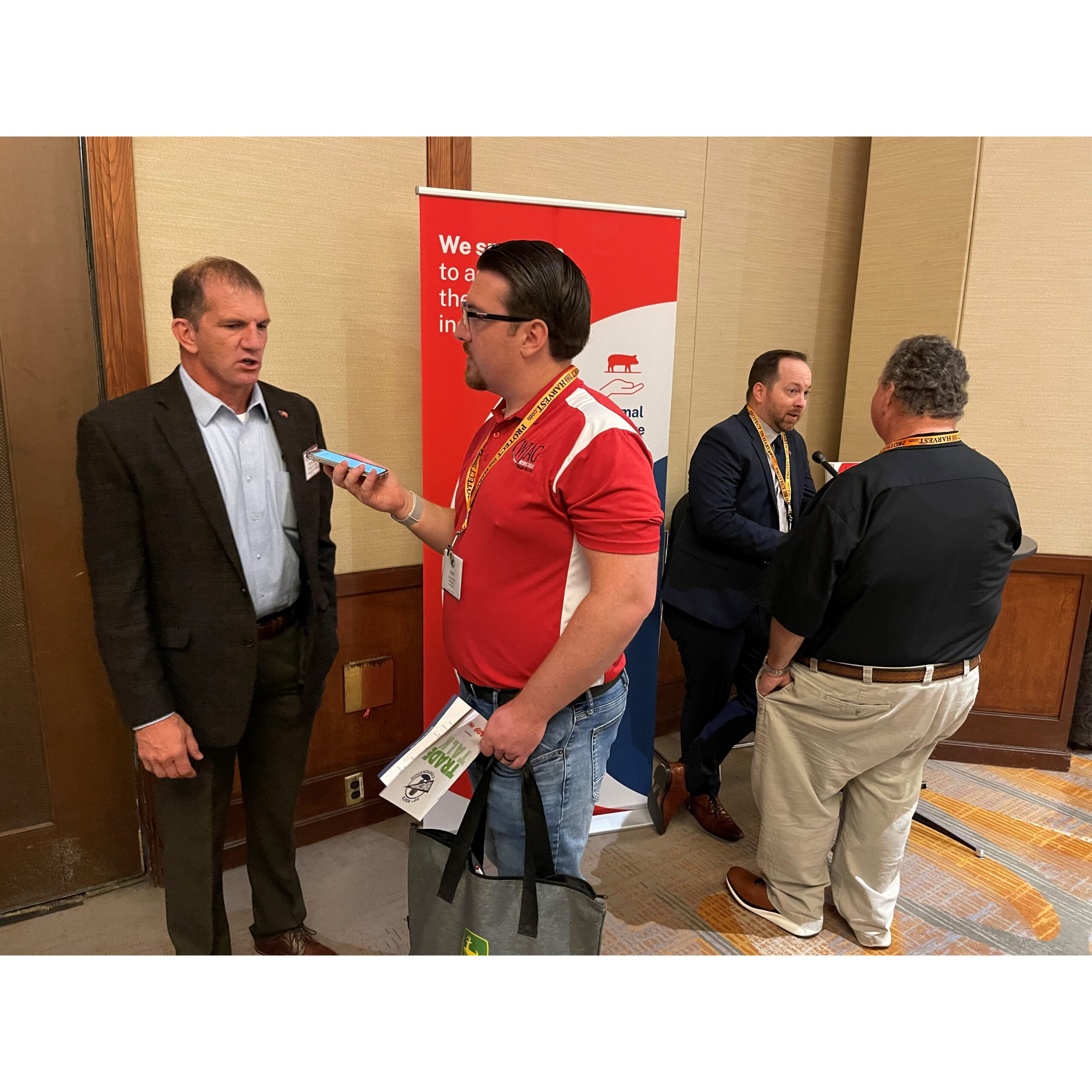
Left: NPPC President and Missouri pork producer Scott Hays speaks with WJAG Radio’s Cody Ronnfeldt. Right: NPPC Senior Policy and Compliance Advisor Andrew Bailey discusses the Beagle Brigade, the importance of foreign animal disease prevention and preparedness, and farm bill extension with the Edge Media Group’s Alan Watts.
NPPC Chief Legal Strategist Michael Formica speaks with Agri-Pulse Communications’ Hannah Pagel.
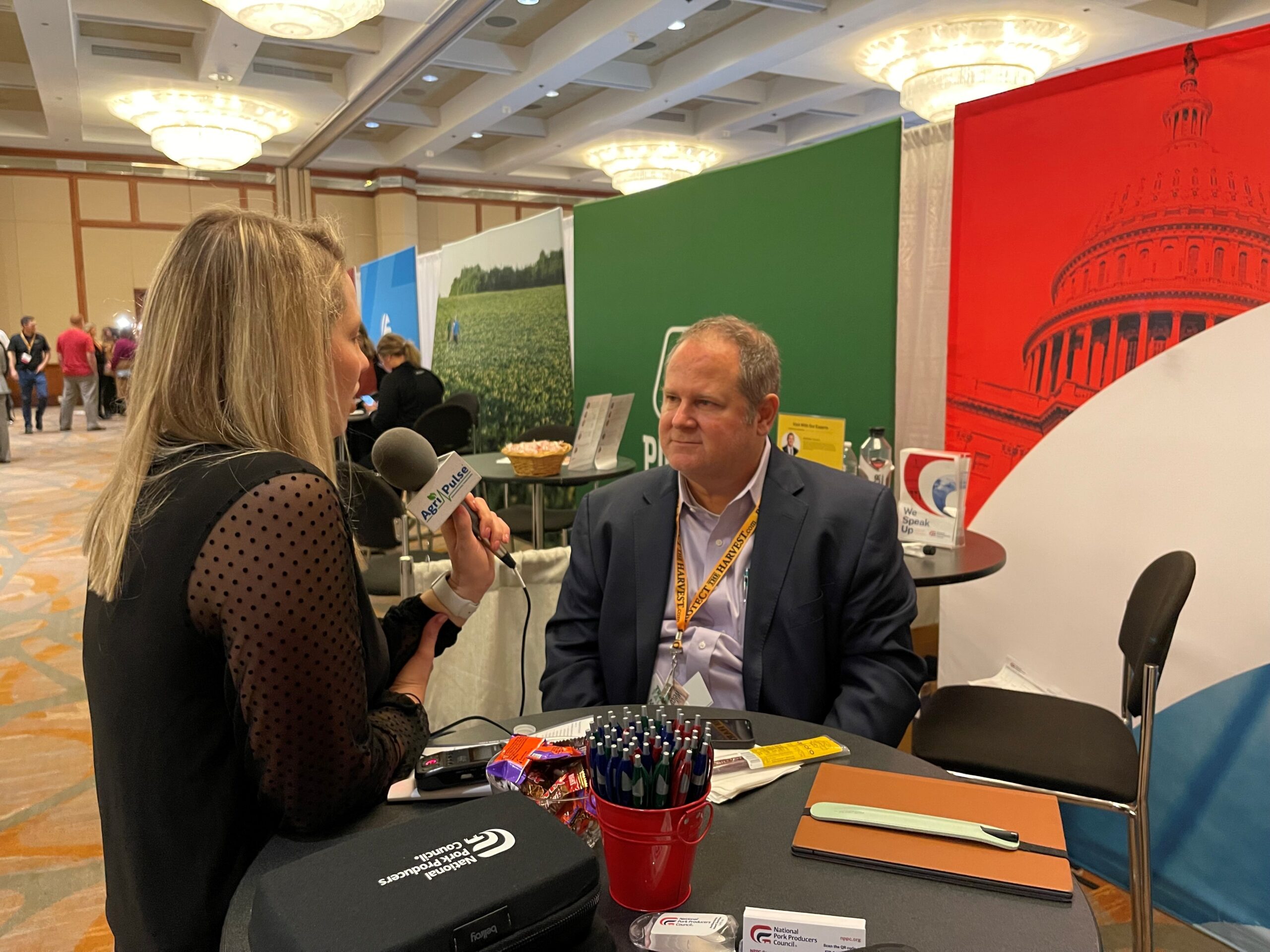
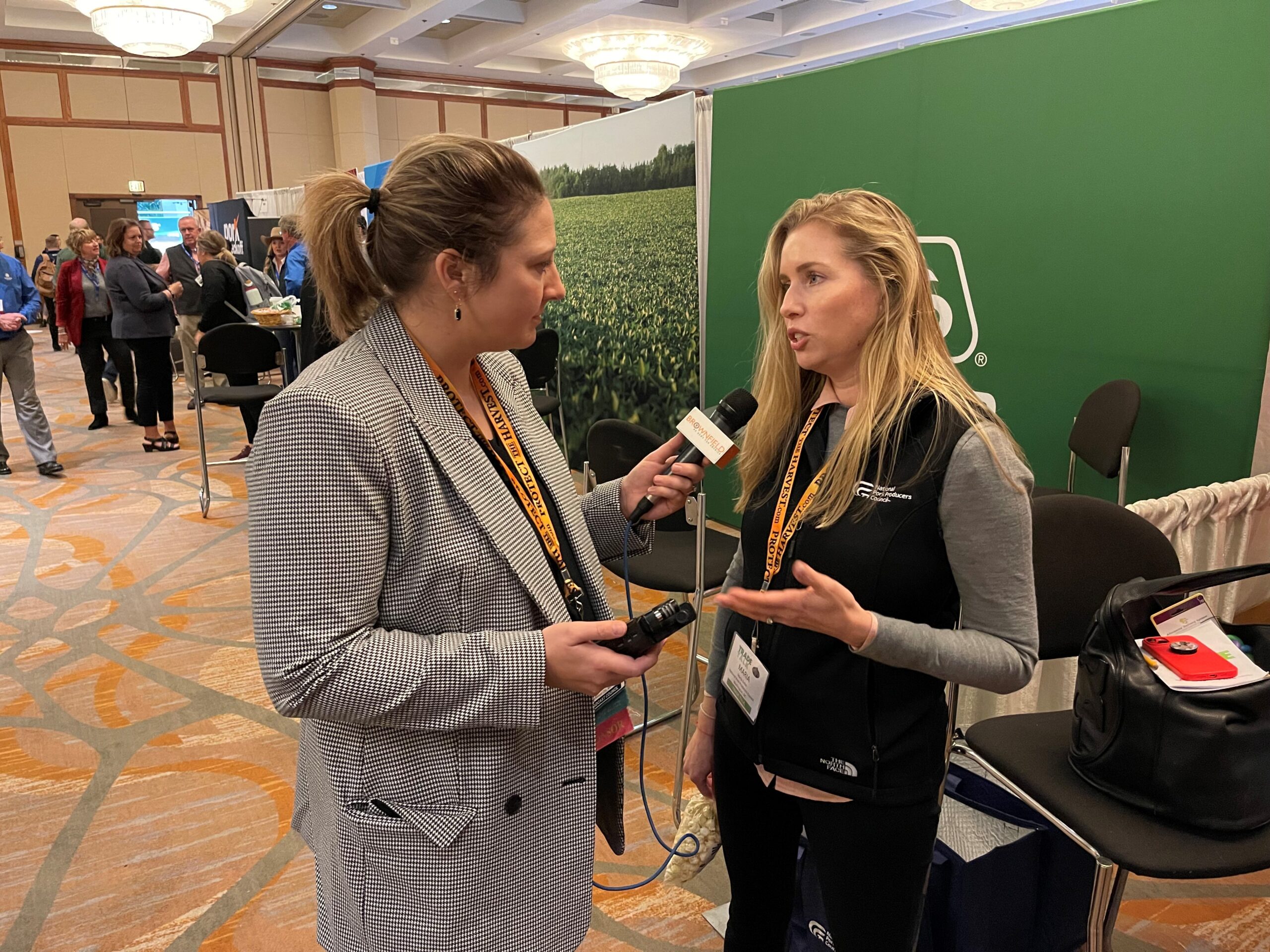
NPPC Vice President of International Affairs Maria C. Zieba talks with Brownfield Ag News’ Carah Hart about international trade market opportunities.
NPPC Economist Holly Cook interviews with Mid-West Farm Report’s Stephanie Hoff, as well as University of Wisconsin-Madison student Natalie Roe.
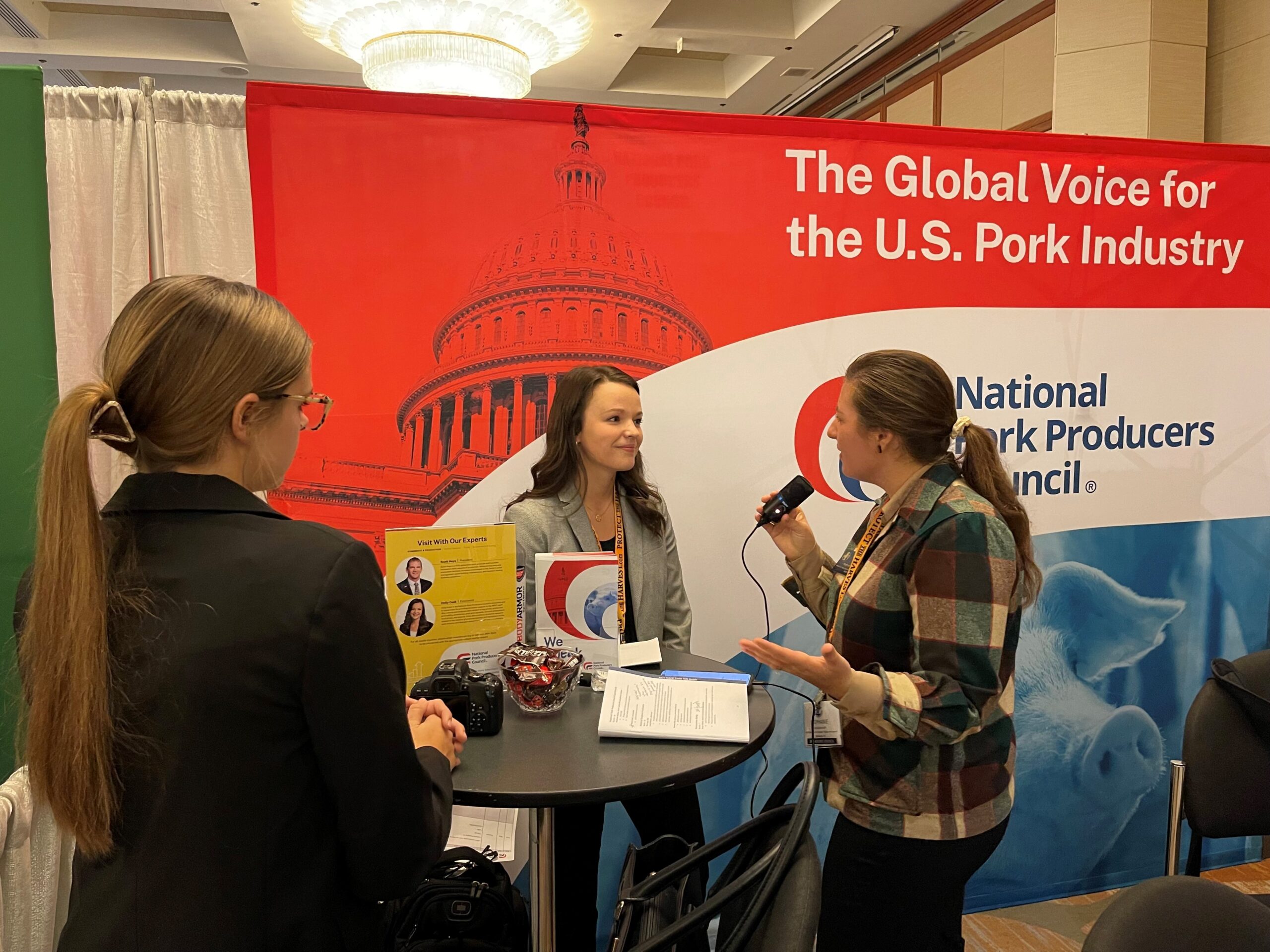
Farm Bill Extended One-Year in New Short-Term Funding Measure
What happened: Congress greenlit another short-term funding bill to sustain government operations. Notably, it includes a nearly one-year extension of the 2018 Farm Bill, which was set to expire today at midnight. Following a bipartisan agreement by Senate and House Agriculture Committee leaders, the farm bill is now extended through September 2024. President Biden is expected to sign the bill into law, which will fund some federal programs, including agricultural, through Jan. 19 with some extended to Feb. 2.
In agreeing to continue the 2018 Farm Bill through the end of fiscal year 2024, Senate Agriculture, Nutrition, and Forestry Committee Chairwoman Debbie Stabenow, D-MI, and Ranking Member John Boozman, R-AR, and House Agriculture Committee Chairman Glenn “GT” Thompson, R-PA, and Ranking Member David Scott, D-GA, vowed to craft a new five-year farm bill next year.
Why it matters: The five-year farm bill sets farm, conservation, forestry, and nutrition policy and authorizes various agricultural programs, including ones related to foreign animal disease (FAD) preparation and prevention and export promotion.
NPPC’s take: NPPC is urging a new farm bill to be finalized in early 2024. The association is pushing for a legislative solution to California Proposition 12, funds to prevent and prepare for FADs, the Market Access and Foreign Market Development export promotion programs, and an adequate safety net for farmers.
USDA to Add Separate Premium Category for Hogs Raised in Compliance with Animal Confinement Legislation
What happened: Starting Monday, the U.S. Department of Agriculture (USDA) will institute a separate category within its National Weekly Direct Swine Non-Carcass Merit Premium report. This category specifically addresses hogs raised in compliance with animal confinement laws (ACL), such as California’s Proposition 12 and Massachusetts’ Question 3. Those voter-approved initiatives require pork sold in those states to be from hogs born to sows raised in housing that meets the states’ standards. Other states also have laws restricting the use of certain sow housing.
Under the Livestock Mandatory Reporting (LMR) Program, USDA had published information on non-carcass merit premiums paid for ACL-compliant hogs under an “other” category that also included other non-carcass characteristics, such as antibiotic-free.
NPPC advocated for and remained engaged with USDA’s Agricultural Marketing Service throughout the process.
Why it matters: Recently, the number of ACL-compliant merit premiums submitted under LMR was sufficient to warrant a separate category. The addition of the category for ACL-compliant hogs will provide pork industry stakeholders with more information when making informed production and marketing decisions.
Click here for more information.
Pork Industry Sustainability in Focus at the Italian Embassy
What happened: Thomas Titus, an NPPC member and pork producer from Elkhart, IL, took center stage at a sustainability event at the Italian embassy in Washington, DC. Titus provided insights into the U.S. pork industry’s sustainability practices during a workshop sponsored by the Embassy of Italy and the American Italian Food Coalition on “Sustainability efforts of the swine meat products and olive oil industries, key ingredients of the Italian table.”
Thomas Hebert, NPPC’s longtime consultant on environmental and conservation issues, moderated the event that also included remarks from Mariangela Zappia, the Italian ambassador to the United States, and Ugo Della Marta, director general for hygiene, food safety, and nutrition at the Italian Ministry of Health.
Why it matters: Titus’ presentation highlighted the industry’s reliance on technology for sustainability, encompassing broad innovations at the industry level and specific solutions at the farm level. He also shed light on collaborative efforts with corn and soybean farmers on the “Farmers for Soil Health” initiative, promoting the adoption of cover crops and conservation tillage to reduce nutrient loss and enhance soil health.
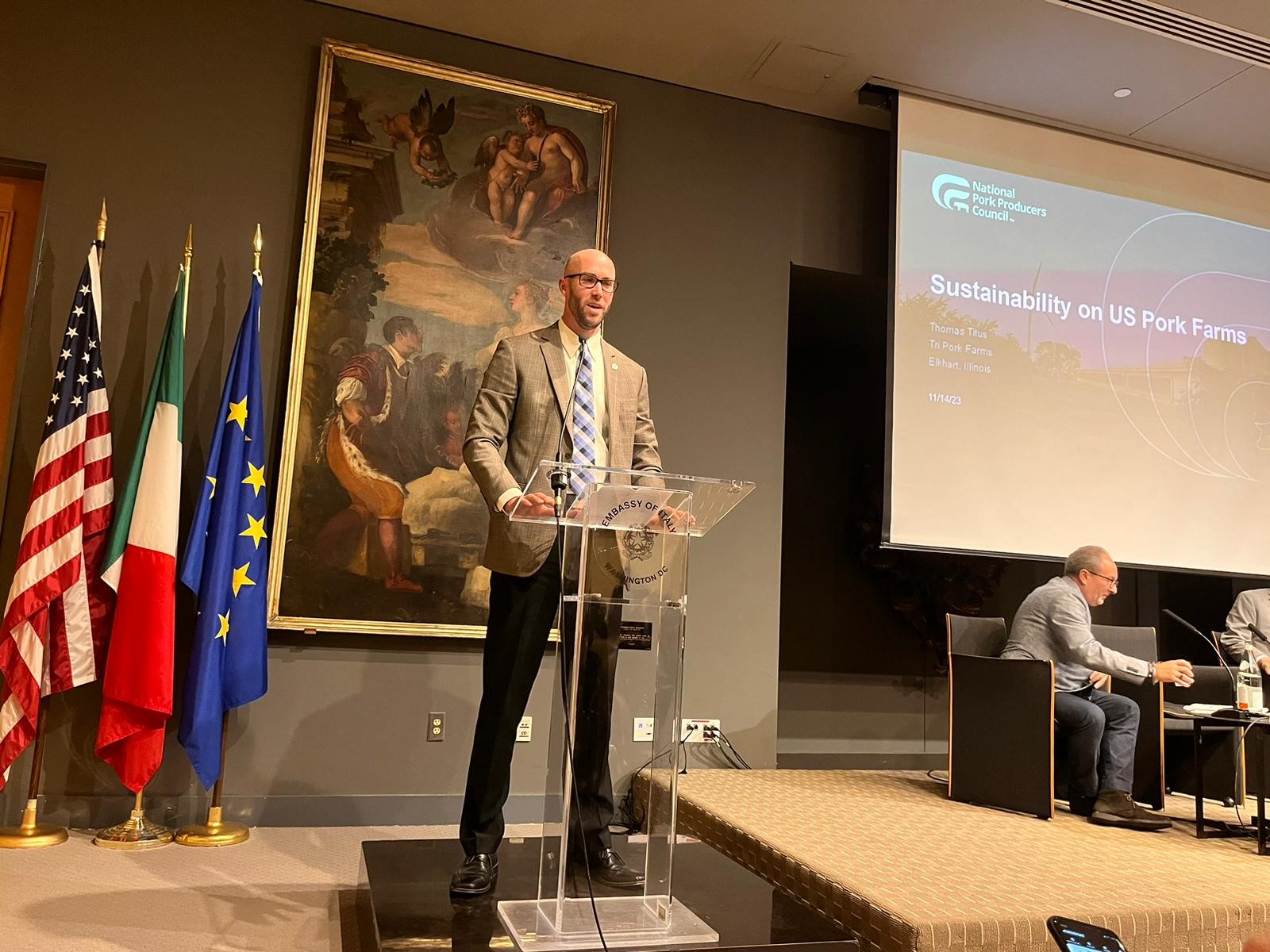
Illinois pork producer Thomas Titus speaks on sustainability on the farm.
Participants and speakers from the pork and olive oil industries.
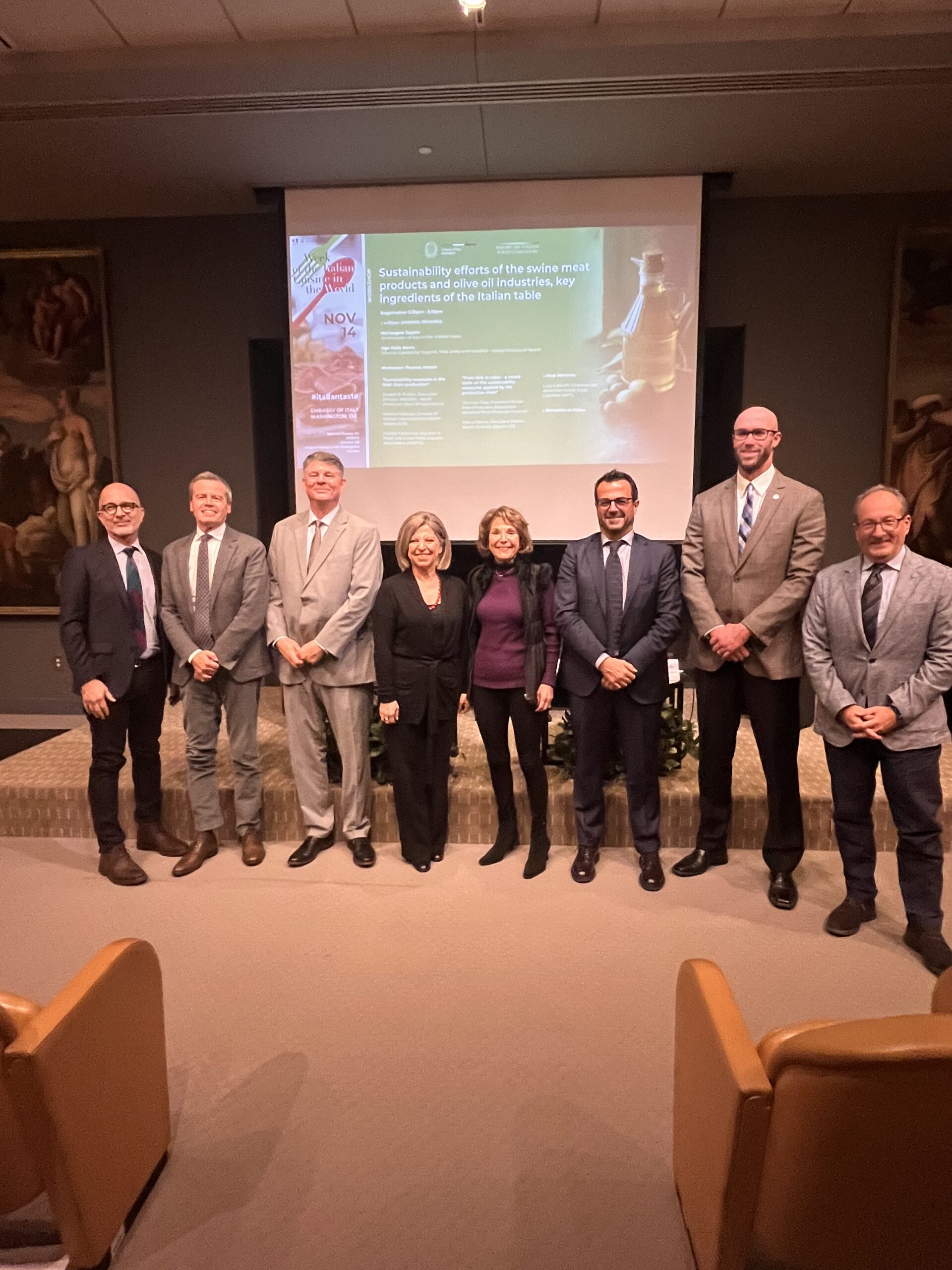
EPA Taking Nominations for New Agricultural Water Quality Panel
What happened: The U.S. Environmental Protection Agency (EPA) announced it is accepting nominations for a new Animal Agriculture and Water Quality (AAWQ) Subcommittee of the Farm, Ranch, and Rural Communities Advisory Committee (FRRCC). The AAWQ will help the EPA comprehensively evaluate the Concentrated Animal Feeding Operation (CAFO) program to consider the most effective ways to reduce pollutants generated from livestock production.
Why it matters: The FRRCC provides independent policy advice, information, and recommendations to the EPA administrator on environmental issues and policies of importance to agriculture and rural communities.
In August, the EPA rejected two petitions filed by environmental and animal rights extremists demanding the agency throw out decades of regulations covering livestock production and adopt rules on pork producers and other livestock farmers that have previously been declared illegal by multiple federal courts. In denying the petitions, EPA agreed to evaluate the CAFO program comprehensively. That evaluation will include a detailed study of the CAFO effluent limitation guidelines and establishment of the AAWQ subcommittee, which will help inform EPA’s efforts to improve its CAFO program.
Call for nominations: Industry representatives interested in serving can contact NPPC Chief Legal Strategist Michael Formica at formicam@nppc.org for more information. Nominations are due Jan. 2, 2024.
Click here for more information.
EPA Evaluating Air Reporting From Livestock Farms
What happened: The U.S. EPA published an Advanced Notice of Proposed Rulemaking to solicit comments and information on reinstating the reporting requirements for livestock farms under the Emergency Planning and Community Right to Know Act (EPCRA). The agency is seeking comments under five broad categories:
- Health impacts
- Implementation challenges
- Costs and benefits
- Small farm definition and reporting exemption
- National report on animal waste air emissions
Additionally, the agency seeks input on emission impacts on local communities in close proximity to farms, and the benefits and challenges associated with the development of a national database of livestock farm production.
Why it matters: This development comes amidst the backdrop of the NPPC’s ongoing advocacy against onerous reporting and permitting requirements for livestock farmers. After a series of legal battles dating back to the early 2000s, Congress, with overwhelming bipartisan support in 2017, passed the Farm Act. This act exempted livestock farms from mandatory reporting under the Superfund Law and relieved them from reporting to the Coast Guard’s national response center and state and local emergency response authorities under EPCRA.
Following a lawsuit filed by environmental and animal rights extremists, EPA agreed to consider rescinding the reporting exemption under EPCRA and imposing a requirement that farmers file reports on routine emissions from manure. Rather than undertake those actions, today’s notice is an acknowledgment that the exemption from reporting will remain in place; instead, EPA will seek to further study the issue. This comes as EPA is expected to release early next year its long-awaited draft Emissions Estimating Methodologies developed under the National Air Emissions Monitoring Study (NAEMS). NAEMS was undertaken following the air consent agreements the industry negotiated with EPA in 2006. The data collected was transmitted to EPA in 2010.
USTR Tai Meets with IPEF, APEC Ministers
What happened: U.S. Trade Representative Katherine Tai hosted the third Indo-Pacific Economic Framework for Prosperity (IPEF) ministerial meeting in San Francisco, focusing on forging closer economic ties among the 14 IPEF countries.
Discussions encompassed trade, clean energy, infrastructure, and fair economies. Tai also met with APEC ministers, addressing trade-related issues. NPPC has been actively advocating for the removal of non-tariff barriers in IPEF countries, with a keen interest in successful negotiations that could enhance trade in the region.
Of note, Ambassador Tai met separately with Peru’s Minister of Trade and Tourism, Juan Carlos Mathews, to discuss among other topics the U.S.-Peru Free Trade Agreement. NPPC’s Maria C. Zieba, vice president of international affairs, met with Mathews earlier this year about market access for U.S. pork.
Why it matters: The IPEF nations represent about 1.5 billion consumers and 40% of the world’s GDP, while APEC countries represent 2.7 billion consumers and about 66% of global GDP. Many of the countries in the IPEF and/or APEC restrict U.S. pork. The U.S. pork industry relies heavily on exports, shipping over 25% of last year’s total production, worth nearly $7.7 billion, to foreign destinations.
NPPC’s take: NPPC has raised with the Biden administration’s trade negotiators the non-tariff barriers of several IPEF countries, including unwarranted food safety, animal health, and technical barriers some IPEF countries have that limit market access for U.S. pork. Successful IPEF negotiations on issues related to supply chains, clean energy and climate change, taxation, and anti-corruption may also improve trade in the region. NPPC looks forward to a successful conclusion of an agreement that addresses the myriad of trade-limiting issues faced by the pork industry.
NPPC President Hays to Take Top Post with Missouri Pork
What happened: NPPC President Scott Hays is set to take the helm as the new executive director for the Missouri Pork Association (MPA) when his term concludes in March. This transition follows the retirement of MPA Executive Vice President Don Nikodim after over 40 years of service. Hays, a fifth-generation pork producer and president of Two Mile Pork, LLC, brings a wealth of experience, having previously served as president of MPA and on its board of directors.
Past NPPC President to Lead U.S. Meat Export Federation
What happened: Renowned Minnesota pork producer Randy Spronk, a past president of NPPC, has been elected as chairman of the U.S. Meat Export Federation (USMEF).
Spronk is president and managing partner for Spronk Brothers Holding, which raises hogs and row crops, and is a past president of the Minnesota Pork Producers Association. Spronk currently represents NPPC on USDA’s Agricultural Policy Advisory Committee.
Why it matters: USMEF plays a crucial role in enhancing demand for U.S. meat in export markets, representing various segments of the meat and livestock industry. NPPC is a member.